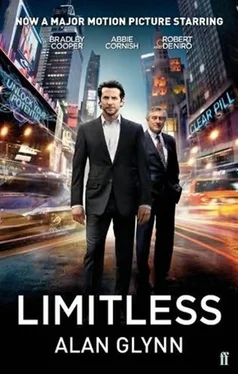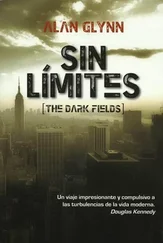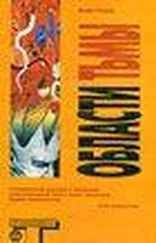My mind was racing now. I picked up a pen and started doodling on a piece of paper, trying to link all of this together.
Eiben-Chemcorp owned Labtech, which was where MDT seemed to have come from. That meant, in effect, that MDT had been developed and produced by an international pharmaceutical corporation. This corporation, in turn, was facing high profile – and potentially very damaging – litigation.
In fact – I turned back to the computer and went into one of the financial websites, and there it was – due to adverse publicity surrounding the case, Eiben-Chemcorp’s stock had already suffered quite a lot, having apparently dropped to 69⅞ from a high earlier in the year of 87¼. This growing public interest in the case would probably continue as the trial date approached. I found numerous articles that had already touched on what would surely be a key point in the trial: if human behaviour was all about synapses and serotonin, then where did free will fit into the picture? Where did personal responsibility end and brain chemistry begin?
Eiben-Chemcorp, in short, was in a very vulnerable position.
I was too, of course – but what I then wondered was how I could use my knowledge of MDT to leverage some advantage out of Eiben-Chemcorp. A supply of MDT in return for not talking to Dave Morgenthaler, perhaps?
I stood up and wandered around the room.
It seemed to me that information coming out in court about an Eiben-Chemcorp product that hadn’t ever been tested, and had already caused numerous deaths, would have a devastating effect on the company’s share price. It was a stark, high-risk option, but given the circumstances it was probably the only option I had left.
I passed by the window again, but didn’t look out this time. After a good deal of thought, I decided that the most practical first step would be to establish contact with Dave Morgenthaler. I would have to be careful how I approached him, but to pose a credible threat to Eiben-Chemcorp, I would need to have Morgenthaler primed for the kill. I would need to be able to set him loose at a moment’s notice.
I made some enquiries and found the number for his office in Boston. I called it immediately and asked to speak to him, but he was out of the office for the day. I left my cellphone number and a message: that I had some ‘explosive’ information about Eiben-Chemcorp and wanted to meet him as soon as possible to discuss it.
When I put the phone down again, I tried to get back to work, to redirect my attention to the MCL-Abraxas deal and to the press conference in the afternoon, but I found it very difficult. I kept reliving the past few weeks in my mind and wishing I’d done this or that – wishing, for instance, that I’d investigated Deke Tauber a little earlier, which might have meant reaching Todd Ellis before he left United Labtech…
I then wondered if there’d been any connection between his death and Vernon’s. But what was the use? Whether Todd Ellis’s death had been accidental or not, that route was now closed off to me. I’d had no choice but to come up with an alternative.
I went over to the window again and gazed at the buildings opposite – gazed down along these vast, vertical plates of steel and glass, all the way down to the streets below, and to the tiny rivulets of people and traffic. This city would be buzzing soon with news of the deal and I would be there when the news broke. But I felt removed from it all now. I felt as though I had entered a confused dream, knowing somehow as I did so that I wouldn’t ever be coming out of it again…
*
This impression was reinforced almost at once, when I was called in to one of the other offices to go over the last-minute arrangements for the press conference. Organized at admittedly very short notice by one of Van Loon’s staffers, the press conference was being held at five o’clock in a midtown hotel. This much I had been aware of, but when I saw now which hotel, I got a return of that sharp, sinking feeling in my stomach.
‘Are you OK?’
This was one of the staffers. I glanced up and looked at him, simultaneously catching sight of my reflection in a mirror that was on a side wall of the office.
My face was deathly pale.
‘Yeah,’ I said, ‘I’m fine, it’s just… a… moment, I think-’
I turned around and rushed out of the office, into the men’s room and straight over to one of the washbasins.
I threw some cold water on my face.
The press conference was going to be held at the Clifden Hotel.
*
Van Loon and I arrived at about three-thirty, and already there was quite a bit of commotion in the place. The first inkling for the media that something was up had come earlier in the day, after Van Loon had phoned a few carefully selected people and told them to cancel whatever they’d had on for the late afternoon. The names Atwood and Bloom were mentioned in the same breath and that had been enough to start a wild fire of rumour and speculation. We’d sent out the press release an hour later. Then the phones had started ringing and hadn’t stopped since.
The Clifden was a forty-five-storey tower rising out of a restored landmark building on Fifty-sixth Street, just off Madison Avenue. It was a luxurious hotel with over 800 rooms, as well as full business and conference facilities. The lobby area led on to a glass-enclosed atrium lounge and beyond that again there was a reception room where we would be holding our press conference.
As Van Loon took a call on his cellphone, I looked around the lobby area very carefully, but I honestly didn’t recognize anything. Even though I had a lingering sense of unease about the whole thing, I came to the confident conclusion that I had never been there before.
Van Loon finished his call. We walked into the atrium lounge, and in the time it took us to cross it Van Loon was approached three times by different journalists. He engaged them in a charming, bantering way, but told them nothing they wouldn’t have heard already or read in the press release. Inside the conference room itself there was a lot of activity, as technical crews set up cameras and tested sound equipment at the back. A little further up the room, hotel staff were laying out rows of foldable chairs, and at the top there was a podium, with two long tables on either side of it. Behind these there were mounted stands displaying the respective logos of the two companies, MCL-Parnassus and Abraxas.
I stood at the back for a while, as Van Loon consulted with some of his regular people in the middle of the room. Behind me, I could hear two technicians talking as they fiddled with wires and cables.
‘… I swear to god, whacked on the back of the head.’
‘ Here? ’
‘With a blunt instrument. You don’t read the papers? She was Mexican. Married to some painter.’
‘Yeah. I remember now. Shit. That was this place?’
I moved away, over towards the doors – so I couldn’t hear them any more. Then I slowly drifted out of the conference room altogether and back into the atrium lounge.
One of the things I remembered quite clearly from that night – from near the end of it, at any rate – was walking along an empty hotel corridor. I could picture it in my mind’s eye still – the low ceiling, the patterned crimson and navy carpet, the magnolia walls, the oak panelled doors flitting past me on either side…
I just didn’t remember anything else about it.
I crossed the lounge and wandered into the lobby area. More people were arriving now and there was a heightened air of anticipation about the place. I saw someone I knew and wanted to avoid, so I slipped over towards the elevators, which were on the far side of the reception desk. But then, as though carried along by some irresistible force, I actually followed two women into an elevator. One of them pressed a button, and then looked at me expectantly, her finger hovering in front of the panel.
Читать дальше












